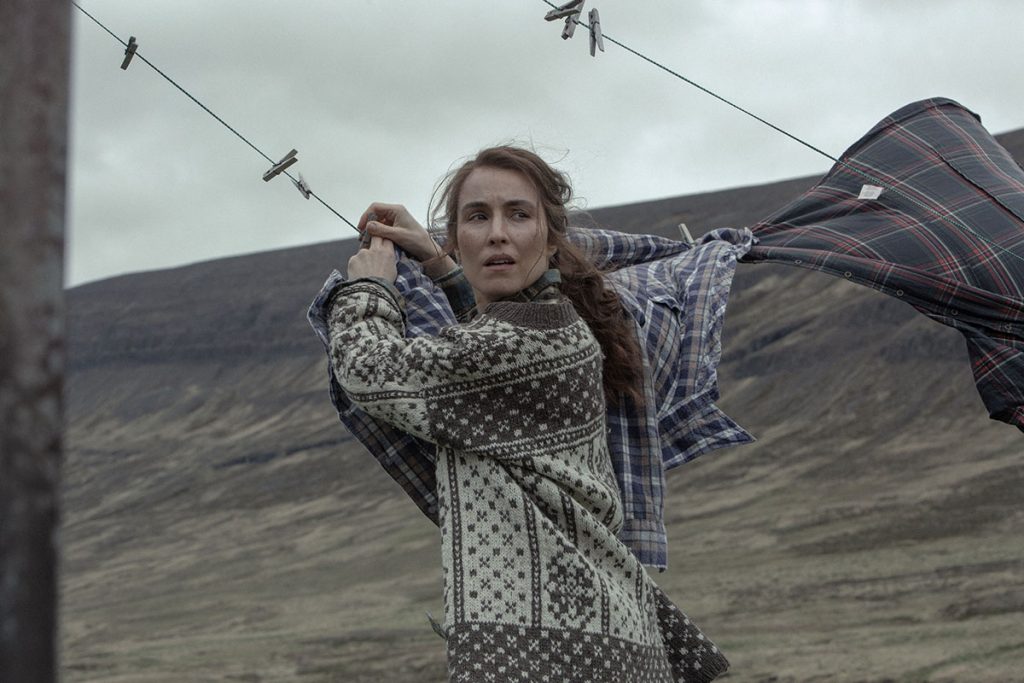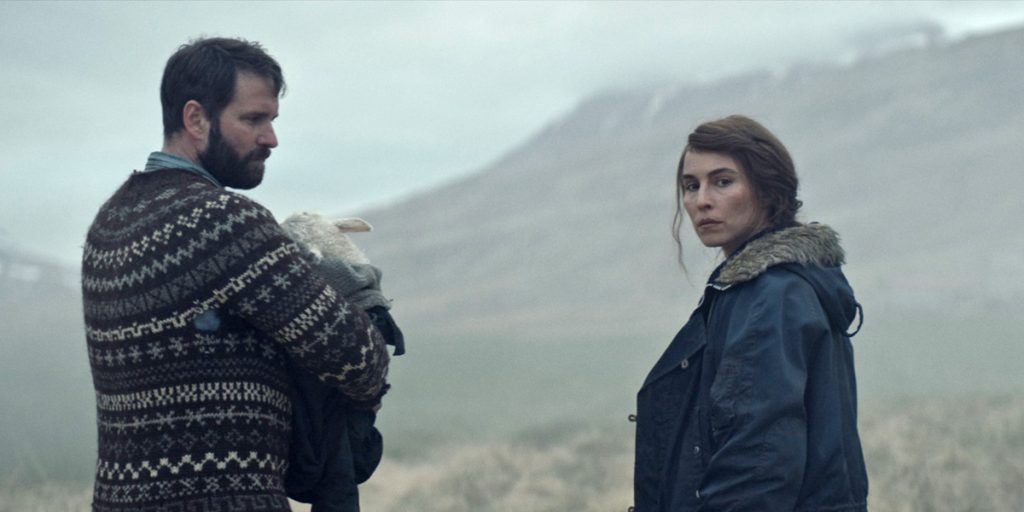Lamb is a twisted yet touching folk horror tale, bolstered by distinguished direction and affecting acting from Noomi Rapace.
If you’ve seen the trailer for A24’s Lamb, chances are you think you’ve already got the film figured out. Since the advert features several of the studio’s signature flourishes (a spine-chilling score, vexing visuals, and, of course, flower crowns), you might assume this is yet another subversive horror story similar to Midsommar or The Witch. However, within mere seconds, it becomes clear that Lamb is something else entirely – something far more sincere and yet simultaneously oh so sad.
No doubt about it, this is quite a twisted tale – and it certainly does dip its toes into folk horror territory on more than one occasion (especially when it comes to its cute but curious central creature) – but it’s a tale that’s surprisingly touching all the same. Truth be told, Lamb doesn’t fit perfectly within any specific genre parameters, but for those who willingly go along with the wild ride writer-director Valdimar Jóhannsson has realized here, they will find themselves rewarded handsomely with the film’s emotionally resonant resolution and timeless themes about the perils of parenting and playing with natural forces outside our control.
When Lamb starts, we follow sullen married sheep farmers María (Noomi Rapace, of Prometheus and The Girl with the Dragon Tattoo) and Ingvar (Hilmir Snær Guðnason, of 101 Reykjavík and The Sea) as they carry out their daily duties in despair, clearly reeling from a recent tragedy that we viewers have not yet been made privy to. This grief not only weighs on their work but their marriage as well, as the two strain to suppress their suffering and find themselves consistently unable to overcome these troubling thoughts. And yet, all it takes is one unexpected occurrence on one odd day for their lives to be forever changed as, when assisting one of their sheep in birth, this ewe produces an animal unlike anything they’ve ever seen in the natural world – a half-lamb, half-human hybrid.
Naming the child Ada, they decide to raise her as their own, despite its mother’s incessant wishes to be reunited with its daughter. Further issues arise with the arrival of Ingvar’s brother Pétur (Björn Hlynur Haraldsson, of The Witcher and Eurovision Song Contest: The Story of Fire Saga), who brings an outside perspective that pokes holes in their familial façade and threatens to put an end to this newfound peace. Can the two safeguard their surrogate daughter, or are they merely living on borrowed time until their family falls apart again?

While a premise such as this might sound preposterous on the page, Jóhannsson and co-writer Sjón (of Robert Eggers’ upcoming The Northman) play it straight until the very end, resisting the temptation to veer into tackier or more theatric territory. Despite the artificial nature of Ada as an entity, the rest of the film is rooted in realism, with Jóhannsson suffusing every scene with straightforward sobriety. This isn’t to say the movie is totally devoid of mirth – as quite a few beats feature festive foolery amongst our main trio, and there is an air of absurdity enveloping the entire endeavor that Jóhannsson leans into – but it nevertheless refuses to treat its primary plot with a “tongue-in-cheek” tone, honoring its protagonists’ emotions and exploring them to their fullest extent.
Given how extensive this emotional exploration is, some may find themselves torn over the speed of Lamb’s pacing (with considerable time allotted to establishing María and Ingvar’s farm prior to Ada’s arrival and even more time that must transpire before the inevitable turmoil of the third act), but, for the most part, Jóhannsson’s methodical handling of the movie’s story suits this particular parable, allowing us to live alongside these leads and truly assimilate into their family dynamic, making the conclusion all the more calamitous.
It should come as no surprise that the ravishing Rapace is at the top of her game here, but it’s still quite sensational to see just how stirring her “softer” side is, especially for those who know her best from her blowout breakthrough role as Lisbeth Salander in Sweden’s The Girl with the Dragon Tattoo. Rapace’s role isn’t without rage – most often directed at Ada’s ewe mother, who frequently follows the family around, practically begging to have her lamb daughter back – but it’s always affecting to watch her truly bond with Ada and “come to life again” in a way, regaining the light that had left her eyes after the tragedy she and her husband endured. Caring for Ada allows her to experience all of her emotions yet again – she laughs, she dances, she makes love, and she’s able to be swept up in sentiment once more.
Rapace characterizes this revitalization compassionately and, when the end of her happiness is near, she depicts this downfall with equal care and consideration (played with a shrewd sensibility that suggests even María knew this set-up couldn’t last forever). Guðnason is a pleasing presence as the insightful and inviting Ingvar, but it’s Haraldsson who almost truly steals the show as the peculiar Pétur, who collides with María and Ingvar’s controlled chaos in a captivating fashion and constantly makes decisions that defy their – and our – expectations, making him an unnervingly unknown variable in this trio.
The arresting atmosphere of the film – delicately directed by Jóhannsson and sumptuously shot by cinematographer Eli Arenson (Black Cat in a Dark Room, Like Animals) – enhances the eerie vibe that the cast and crew work so hard to cultivate here and assists in our complete absorption in the increasing idiosyncrasy. Though we never really leave the confines of this specific patch of the Swedish countryside, Jóhannsson and Arenson masterfully maximize the setting and make the most of the site regardless while additionally emphasizing just how far this trio is from the rest of the world – and how evil events can occur at any moment to the knowledge of no one else. Þórarinn Guðnason’s spectral and spooky score also figures into the film’s frightening allure, keeping the audience on edge with the implication that danger is around every corner and our trio is always threatened by spiteful souls lurking in the shadows (or maybe even each other). Overall, the technical work in Lamb is off the charts, and the movie’s effectiveness depends on this team’s efficiency.
Lamb may not be the relentlessly terrifying thrill ride some A24 fans are expecting from that skillfully cut teaser trailer, but if one opens themself up to writer-director Valdimar Jóhannsson’s meaningful musings on a parent’s personal recovery from terrible tragedy and the lengths they will go to to recapture this love in their life, they’ll find that they are thoroughly entranced in this fantastical fable all the same. Accompanied by arresting visuals and a superb sense of mood, Lamb’s story is tremendously tense and terrifically thought-provoking in equal measure, providing both the requisite genre thrills and additional (and appreciated) analysis of the astounding anguish of those in grief.
Lamb will be released in US theaters on October 8, 2021 in cinemas across the UK on November 10, 2021, and on MUBI on February 25, 2022.

